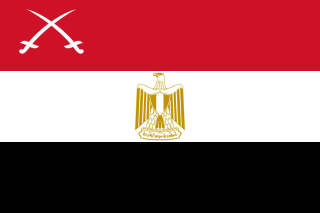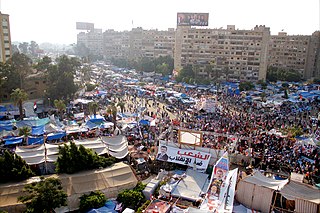Related Research Articles

The Egyptian Armed Forces are the military forces of the Arab Republic of Egypt. They consist of the Egyptian Navy, Egyptian Air Force and Egyptian Air Defense Forces. Previously, there was a separate command for the Egyptian Land Forces on March 25, 1964, but it was officially abolished after the Six-Day War of 1967, so that the command of the land formations returned directly to the Chief of Staff of the Armed Forces, and the ground formations were divided to the forces east of the canal, under whose command the two armies and the military regions, in contrast to the rest of the forces, bodies, departments, and auxiliary agencies.
The history of Egypt has been long and wealthy, due to the flow of the Nile River with its fertile banks and delta, as well as the accomplishments of Egypt's native inhabitants and outside influence. Much of Egypt's ancient history was unknown until Egyptian hieroglyphs were deciphered with the discovery and deciphering of the Rosetta Stone. Among the Seven Wonders of the Ancient World is the Great Pyramid of Giza.

The Six-Day War, also known as the June War, 1967 Arab–Israeli War or Third Arab–Israeli War, was fought between Israel and a coalition of Arab states, primarily Egypt, Syria, and Jordan from 5 to 10 June 1967.

The Yom Kippur War, also known as the Ramadan War, the October War, the 1973 Arab–Israeli War, or the Fourth Arab–Israeli War, was fought from 6 to 25 October 1973 between Israel and a coalition of Arab states led by Egypt and Syria. Most of the fighting occurred in the Sinai Peninsula and Golan Heights, territories occupied by Israel in 1967. Some combat also took place in Egypt and northern Israel. Egypt aimed to secure a foothold on the eastern bank of the Suez Canal and use it to negotiate the return of the Sinai Peninsula.

Muhammad Anwar es-Sadat was an Egyptian politician and military officer who served as the third president of Egypt, from 15 October 1970 until his assassination by fundamentalist army officers on 6 October 1981. Sadat was a senior member of the Free Officers who overthrew King Farouk I in the Egyptian Revolution of 1952, and a close confidant of President Gamal Abdel Nasser, under whom he served as Vice President twice and whom he succeeded as president in 1970. In 1978, Sadat and Menachem Begin, Prime Minister of Israel, signed a peace treaty in cooperation with United States President Jimmy Carter, for which they were recognized with the Nobel Peace Prize.

Gamal Abdel Nasser Hussein was an Egyptian military officer and politician who served as the second president of Egypt from 1954 until his death in 1970. Nasser led the Egyptian revolution of 1952 and introduced far-reaching land reforms the following year. Following a 1954 attempt on his life by a Muslim Brotherhood member, he cracked down on the organization, put President Mohamed Naguib under house arrest and assumed executive office. He was formally elected president in June 1956.

Muhammad Hosni El Sayed Mubarak was an Egyptian politician and military officer who served as the fourth president of Egypt from 1981 to 2011.

The Suez Crisis also known as the Second Arab–Israeli War, the Tripartite Aggression in the Arab world and as the Sinai War in Israel, was a British–French–Israeli invasion of Egypt in 1956. Israel invaded on 29 October, having done so with the primary objective of re-opening the Straits of Tiran and the Gulf of Aqaba as the recent tightening of the eight-year-long Egyptian blockade further prevented Israeli passage. After issuing a joint ultimatum for a ceasefire, the United Kingdom and France joined the Israelis on 5 November, seeking to depose Egyptian president Gamal Abdel Nasser and regain control of the Suez Canal, which Nasser had earlier nationalised by transferring administrative control from the foreign-owned Suez Canal Company to Egypt's new government-owned Suez Canal Authority. Shortly after the invasion began, the three countries came under heavy political pressure from both the United States and the Soviet Union, as well as from the United Nations, eventually prompting their withdrawal from Egypt. Israel's four-month-long occupation of the Egyptian-occupied Gaza Strip and Egypt's Sinai Peninsula enabled it to attain freedom of navigation through the Straits of Tiran, but the Suez Canal was closed from October 1956 to March 1957.

Mamluk or Mamaluk were non-Arab, ethnically diverse enslaved mercenaries, slave-soldiers, and freed slaves who were assigned high-ranking military and administrative duties, serving the ruling Arab and Ottoman dynasties in the Muslim world.

The War of Attrition involved fighting between Israel and Egypt, Jordan, the Palestine Liberation Organisation (PLO) and their allies from 1967 to 1970.

The New Kingdom, also referred to as the Egyptian Empire, was the ancient Egyptian state between the 16th century BC and the 11th century BC. This period of ancient Egyptian history covers the Eighteenth, Nineteenth, and Twentieth Dynasties. Through radiocarbon dating, the establishment of the New Kingdom has been placed between 1570 BC and 1544 BC. The New Kingdom followed the Second Intermediate Period and was succeeded by the Third Intermediate Period. It was the most prosperous time for the Egyptian people and marked the peak of Egypt's power.

The Egyptian Army, officially the Egyptian Ground Forces, is the land warfare branch of the Egyptian Armed Forces. It is the largest service branch of the Egyptian Armed Forces. It was known as the Royal Egyptian Army until the declaration of the Republic and the abolishment of the monarchy on 18 June 1953.

Muhammad Hussein Tantawi Soliman was an Egyptian field marshal and politician. He was the commander-in-chief of the Egyptian Armed Forces and, as chairman of the Supreme Council of the Armed Forces, was the de facto head of state from the ousting of President Hosni Mubarak on 11 February 2011 until the inauguration of Mohamed Morsi as president of Egypt on 30 June 2012.

Egypt, officially the Arab Republic of Egypt, is a transcontinental country spanning the northeast corner of Africa and the Sinai Peninsula in the southwest corner of Asia. It is bordered by the Mediterranean Sea to the north, the Gaza Strip of Palestine and Israel to the northeast, the Red Sea to the east, Sudan to the south, and Libya to the west. The Gulf of Aqaba in the northeast separates Egypt from Jordan and Saudi Arabia. Cairo is the capital and largest city of Egypt, while Alexandria, the second-largest city, is an important industrial and tourist hub at the Mediterranean coast. At approximately 100 million inhabitants, Egypt is the 14th-most populated country in the world, and the third-most populated in Africa.

The Kingdom of Egypt was the legal form of the Egyptian state during the latter period of the Muhammad Ali dynasty's reign, from the United Kingdom's recognition of Egyptian independence in 1922 until the abolition of the monarchy of Egypt and Sudan in 1953 following the Egyptian Revolution of 1952. Until the Anglo-Egyptian treaty of 1936, the Kingdom was only nominally independent, as the United Kingdom retained control of foreign relations, communications, the military, and Sudan. Officially, Sudan was governed as a condominium of the two states; however, in reality, true power in Sudan lay with the United Kingdom. Between 1936 and 1952, the United Kingdom continued to maintain its military presence, and its political advisers, at a reduced level, which resulted in the increase of Egyptian sovereignty and independence.

The 2011 Egyptian revolution, also known as the 25 January Revolution, began on 25 January 2011 and spread across Egypt. The date was set by various youth groups to coincide with the annual Egyptian "Police holiday" as a statement against increasing police brutality during the last few years of Hosni Mubarak's presidency. It consisted of demonstrations, marches, occupations of plazas, non-violent civil resistance, acts of civil disobedience and strikes. Millions of protesters from a range of socio-economic and religious backgrounds demanded the overthrow of Egyptian President Hosni Mubarak. Violent clashes between security forces and protesters resulted in at least 846 people killed and over 6,000 injured. Protesters retaliated by burning over 90 police stations across the country.

Abd el-Fattah el-Sisi is an Egyptian politician and retired military officer who has been serving as the sixth and current president of Egypt since 2014. Before retiring as a general in the Egyptian military in 2014, Sisi served as Egypt's deputy prime minister from 2013 to 2014, minister of defense from 2012 to 2013, and director of military intelligence from 2010 to 2012. He was promoted to the rank of Field Marshal in January 2014.

The Sinai insurgency was an insurgency in the Sinai Peninsula of Egypt, launched by Islamist militants against Egyptian security forces, which also included attacks on civilians. The insurgency began during the Egyptian Crisis, during which the longtime Egyptian president Hosni Mubarak was overthrown in the 2011 Egyptian revolution.

Muhammad Ali was an Ottoman Albanian governor and military commander who was the de facto ruler of Egypt from 1805 to 1848, considered the founder of modern Egypt. At the height of his rule, he controlled Egypt, Sudan, Hejaz, the Levant, Crete and parts of Greece.

The 2013 Egyptian coup d'etat took place on 3 July 2013. Egyptian army chief General Abdel Fattah el-Sisi led a coalition to remove the democratically elected President of Egypt Mohamed Morsi from power and suspended the Egyptian constitution of 2012. The move came after the military's ultimatum for the government to "resolve its differences" with protesters during widespread national protests. The military arrested Morsi and Muslim Brotherhood leaders, and declared Chief Justice of the Supreme Constitutional Court Adly Mansour as the interim president of Egypt. The announcement was followed by demonstrations and clashes between supporters and opponents of the move throughout Egypt.
References
- ↑ "Egypt : Governance : The Military". Fanack Chronicle. Retrieved 14 February 2016.